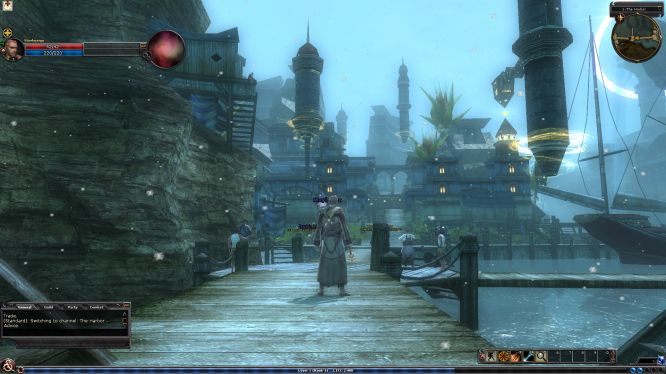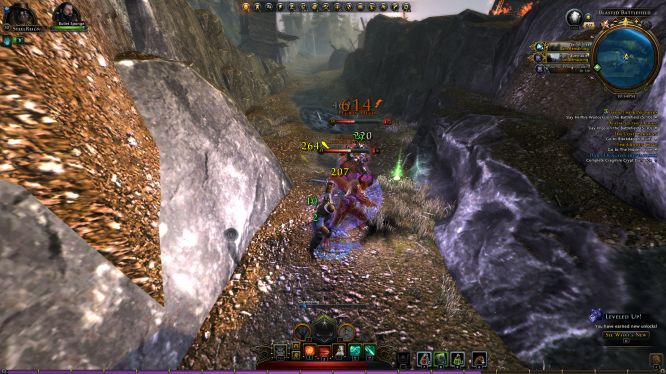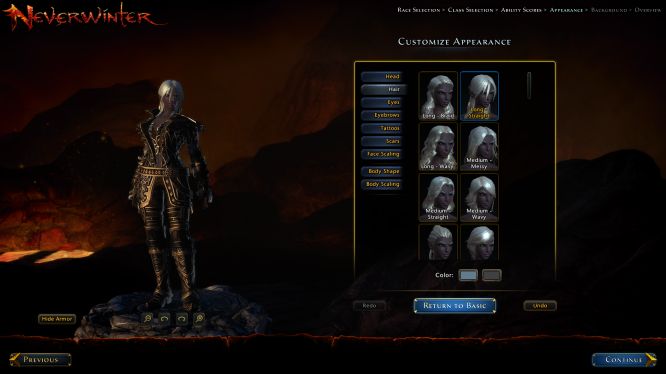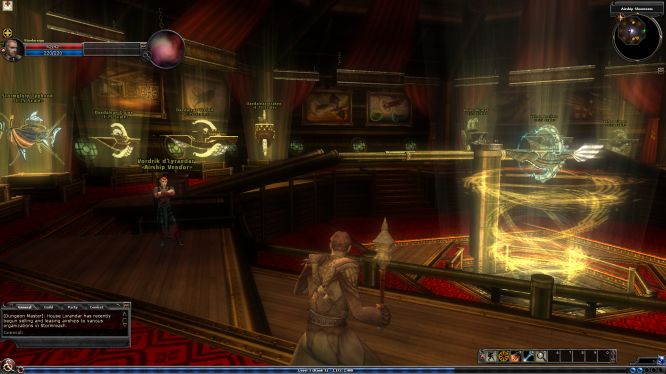Once upon a time, geeks across the country flocked to the darkest depths of their parents’ basements where they would role dice and take turns creating epic tales. While Dungeons & Dragons maintained a very popular subculture for quite some time, it has also seen a shift to the virtual medium. No longer do friends sit in crowded basements or tucked-away game stores, but instead they interact with each other through emotes and VoIPs. As technology changes, we also change with it, but that doesn’t mean we can’t stay true to who we are. As proof, there are two fairly popular MMORPGs that follow very closely to those D&D roots. Both Dungeons & Dragons Online and Neverwinter have the positives and negatives, but which one follows more closely to the true D&D formula?
PRICING STRUCTURE – DDO
The first thing that most old school D&D players had to do was rush out and buy a copy of whatever rulebook they intended on playing. DDO follows this example pretty accurately, but players do get the first big pack of content for free. Even though the actual world of DDO is quite small, there’s still a solid amount of content and dungeons that players can enjoy for free. It’s even possible to earn premium currency, Favor Points, by completing various tasks and clearing dungeons, which can then be turned into Turbine Points. While this process can take upwards of a few years, it’s possible to buy all of the additional races and adventure packs by converting this favor.
 Stormreach Harbor... where the magic really begins.
Stormreach Harbor... where the magic really begins.
If grinding forever isn’t quite your style then DDO also offers a subscription service that runs from $8.25 to $14.99 per month depending on the duration of a subscription. As long as this VIP status is active players have access to all of the premium content, with the exception of expansions, including new races, classes, adventures, 500 monthly Turbine points, and priority beta access. Being able to choose between a subscription and a la carte purchases puts DDO ahead of most other free-to-play MMOs in the pricing department.
While DDO markets content for their currency, Neverwinter does the complete opposite and markets it as a necessary commodity. Their premium currency, Zen, is necessary for pretty much everything in the game and advertisement for it is constantly forced down players’ throats. Want more than 2 character slots, oh that’ll cost 500 Zen. Want to reroll a character’s race or name, you guessed it more Zen. In similar fashion to DDO, and most other free-to-play MMORPGs, it is also possible to earn Zen by completing various daily quests in the game, however, the rate at acquiring it is painfully slow. Astral Diamonds can be refined at a rate of 24,000 per day. The average price right now is about 500 diamonds per Zen, which is less than 50 each day.
To put things in perspective, a small bag costs 600 Zen. That’s 12 days of grinding for a 12 slot bag! Furthermore, all auction house purchases can only be done with the use of Astral Diamonds, making gold fundamentally useless, so players can either choose to buy items from the AH or invest in Zen; it’s fairly difficult and time consuming to try and do both. To make matters worse, there are some classes that can’t even be purchased with Zen. The Dragonborn currently requires a piece of DLC priced at $74.99 and certain variations of the Drow and Elf also require relatively expensive content packs. Not only do these packs contain exclusive races, but many of them also come with epic items and artifacts. If that’s not pay-to-win I’m not sure what is. It should be pretty clear at this point that Neverwinter is not the winner when it comes to price structure.
THE DUNGEON MASTER – NEVERWINTER
The way DDO utilizes various voices for Dungeon Masters during dungeon exploration adds a very personal touch to the game, but that’s nothing compared to the Foundry; in Neverwinter you are the Dungeon Master. Players can create their own quests from scratching including NPCs, background, dialog, setting, custom items, and almost anything else a dungeon crawler could imagine. Not only can players create single quests, but they can create entire campaigns that progress players through a number of quests in linear fashion.
The pinnacle of any Dungeon Master’s tenure is to have their adventures praised by players far and wide. With the rating system, the best of the best custom-made adventures can be sorted through and donations of Astral Diamonds can even be given to their creators. Scenarios are given a weighted scored based on the number of players that go through them; even a high-rated quest with only a few playthroughs will display a mediocre score. The Foundry truly adds an element that isn’t seen all that often in MMORPGs and is one of the better executed aspects of Neverwinter.
GAMEPLAY – DDO
When comparing the combat mechanics of DDO and Neverwinter it really comes down to personal preference. Both games have excellent, active combat systems that feel more like a third-person action game than the stereotypical, sluggish tab-targeting variety MMORPG. DDO was definitely ahead of its time when released, but Neverwinter has stepped up the ante quite considerably. The fights in Neverwinter are fast-paced, use flashy skills, and require well-timed positioning and active dodging. Unfortunately, the number of available skills are harshly limited and it costs Zen to respect into different talents.
[caption id="attachment_39911" align="aligncenter" width="666"] Neverwinter does have some fantastic skill animations, but it falls a little short on depth.[/caption]
Neverwinter does have some fantastic skill animations, but it falls a little short on depth.[/caption]
Therefore, the biggest difference between DDO and Neverwinter is whether you want a twitch-based fighting system or one that’s slightly more methodical and strategic. In DDO there is an insane amount of skills and different ways that a character can be specialized. The combat might not be quite as intense but there’s also an available skill for every job. When it comes to the Dungeons & Dragons universe, and the true nature of roleplaying a character, I’m inclined to believe that DDO has a more accurate, or at least relevant, combat system that fans would appreciate.
VISUALS – NEVERWINTER
It really isn’t quite fair to compare a 2006 release to a 2013 one when it comes to graphical fidelity, but it is something present nonetheless. That being said, DDO hasn’t suffered nearly as much as one would think after so many years. Yes, the game is a little rough around the edges, but the updates have kept visual options relevant enough to make the game more than tolerable to look at. When compared side-by-side to Neverwinter it’s quite obvious who the winner is based on pure aesthetic detail. That detail does appear to come at a cost, however, as many aspects of the game look fairly generic.
For example, look at the character creation menu. The characters are obviously more polished than in DDO, but there’s a definite lack of uniqueness to them. No matter how hard you try, all of the characters of the same race will look relatively similar, however, in DDO you can create much more varied individual with only a few tools. There are some other aspects of DDO that haven’t aged so well, though. When it comes to spells and abilities, Neverwinter is miles ahead in terms of clean, vibrant-looking animations. It’s generally difficult to argue that Neverwinter isn’t more pleasing to the eye overall.
[caption id="attachment_39912" align="aligncenter" width="666"] Regardless of how many appearances I test out for my Drow, she always kind of looks the same.[/caption]
Regardless of how many appearances I test out for my Drow, she always kind of looks the same.[/caption]
GUILDS – DDO
In Neverwinter a guild servers the same task that it does in most other games, and that is to bring players together. As a guild leader you can publish the day’s news, host events, grant permissions and manage the bank. This system isn’t much different from most other games, but it also doesn’t bring anything new or exciting either. Instead, Neverwinter decides to play it safe and create a very generic purpose for guilds and that’s perfectly fine on its own. However, when comparing it to DDO’s guild system, it definitely comes up lacking.
Not only do guilds in DDO serve as a community hub, but they also serve in-game functions. One of the coolest guild perks is the ability to purchase an airship that can carry the guild to destinations around the world. Not only does this save time required to travel between zones but it also lets you get there in style. Of course airships aren’t just handed out to every guild; they have to be earned. Currently there are 200 Guild Levels that are earned by leveling up a respective guild’s renown through killing monsters, completing quests, and opening chests. There are all kinds of perks gained through guild levels including vendors, training dummies, a guild bank, and shrines that provide buffs. DDO takes the standard guild functions and then steps it up a few notches.
[caption id="attachment_39913" align="aligncenter" width="666"] Oh, to be an airship captain for a day.[/caption]
Oh, to be an airship captain for a day.[/caption]
WINNER – DDO
It’s hard to believe that a nine-year-old game can still put up a good fight, but this just goes to prove that newer isn’t always better. Neverwinter does have some great aspects and the Foundry is a true game changer, but it also has a borderline offensive payment model and has strayed a bit from the true Dungeons & Dragons atmosphere. If you’re looking for an authentic role-playing experience then Dungeons & Dragons Online is the way to go. It still has that methodical basement feeling to it, a great guild system, fun combat, and tons of content waiting to be unlocked.